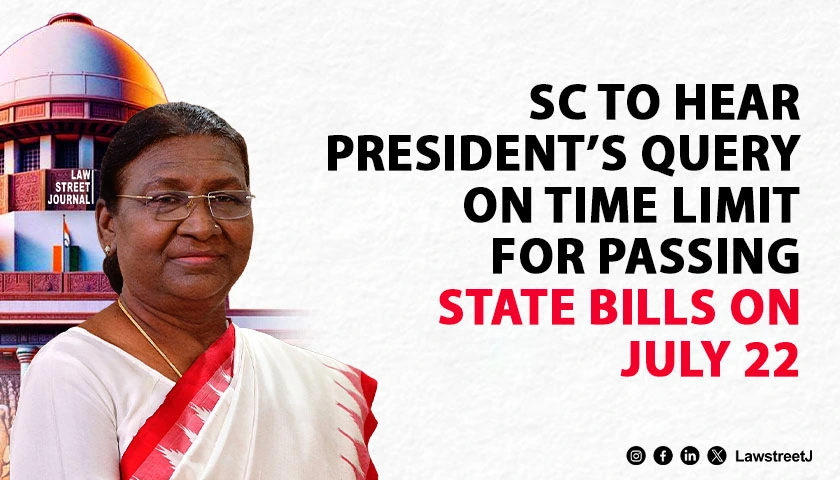NEW DELHI: The Supreme Court is set to consider on July 22 a reference made by President Droupadi Murmu on legal questions arising out of the apex court's judgment setting a timeline for the Governor and the President to clear the Bills passed by state legislatures.
A special bench of Chief Justice of India B R Gavai and Justices Surya Kant, Vikram Nath, P S Narasimha and Justice Atul S Chandurkar would take up the special reference registered as 'In Re: Assent, Withholding or Reservation of Bills by the Governor And the President of India'.
After the April 8 judgment fixing a timeline for the Governor and the President on clearing of Bills passed by state legislatures, President Droupadi Murmu has made a reference to the Supreme Court to decide if this can be done through judicial orders in the absence of the constitutionally prescribed timeline for it.
In its judgment, a bench of Justice J B Pardiwala and R Mahadevan declared TN Governor R N Ravi's decision to reserve 10 bills for President after those were re-enacted as illegal.
The court had then set the timeline, saying that the President is required to take a decision on the bills reserved for his consideration by the Governor within a period of three months.
The judgment, which also declared all those Bills without assent of the Governor or the President as passed using its power under Article 142 of the Constitution, faced criticism for being in judicial overreach and in violation of the principle of separation of powers.
Vice President Jagdeep Dhankhar, Kerala governor Rajendra Vishwanath Arlekar, and senior government officials called out the apex court for setting deadlines for the Executive wing of the government, and its use of Article 142 to clear Bills.
Subsequently, in exercise of power under Article 143(1) of the Constitution, the President made the reference. The provision allows the President to seek the opinion of the Supreme Court on any question of law or fact of public importance.
In the reference made on May 13, 2025, the President sought opinion of the Supreme Court on 14 questions, including whether the exercise of constitutional discretion by the President under Article 201 of the Constitution of India is justiciable.
"Are the decisions of the Governor and the President under Article 200 and Article 201 of the Constitution, respectively, justiciable at a stage anterior into the law coming into force? Is it permissible for the Courts to undertake judicial adjudication over the contents of a Bill, in any manner, before it becomes law," the reference asked.
It also asked if the exercise of constitutional powers and the orders of/by the President / Governor can be substituted in any manner under Article 142 of the Constitution of India.
It also sought opinion if a law made by the State legislature is a law in force without the assent of the Governor granted under Article 200 of the Constitution.
"In view of the proviso to Article 145(3) of the Constitution, is it not mandatory for any bench of this court to first decide as to whether the question involved in the proceedings before it is of such a nature which involves substantial questions of law as to the interpretation of constitution and to refer it to a bench of minimum five judges," it further asked.
The reference also asked if the powers of the Supreme Court under Article 142 of the Constitution are limited to matters of procedural law or Article 142 of the Constitution of India extends to issuing directions/passing orders which are contrary to or inconsistent with existing substantive or procedural provisions of the Constitution or law in force.
"Does the Constitution bar any other jurisdiction of the Supreme Court to resolve disputes between the Union Government and the State Governments except by way of a suit under Article 131 of the Constitution of India," it also asked.
The President felt in prevailing circumstances when the States are frequently approached the Supreme Court invoking Article 32 and 131 of the Constitution, it was expedient to seek the opinion of the Supreme Court on legal questions.















